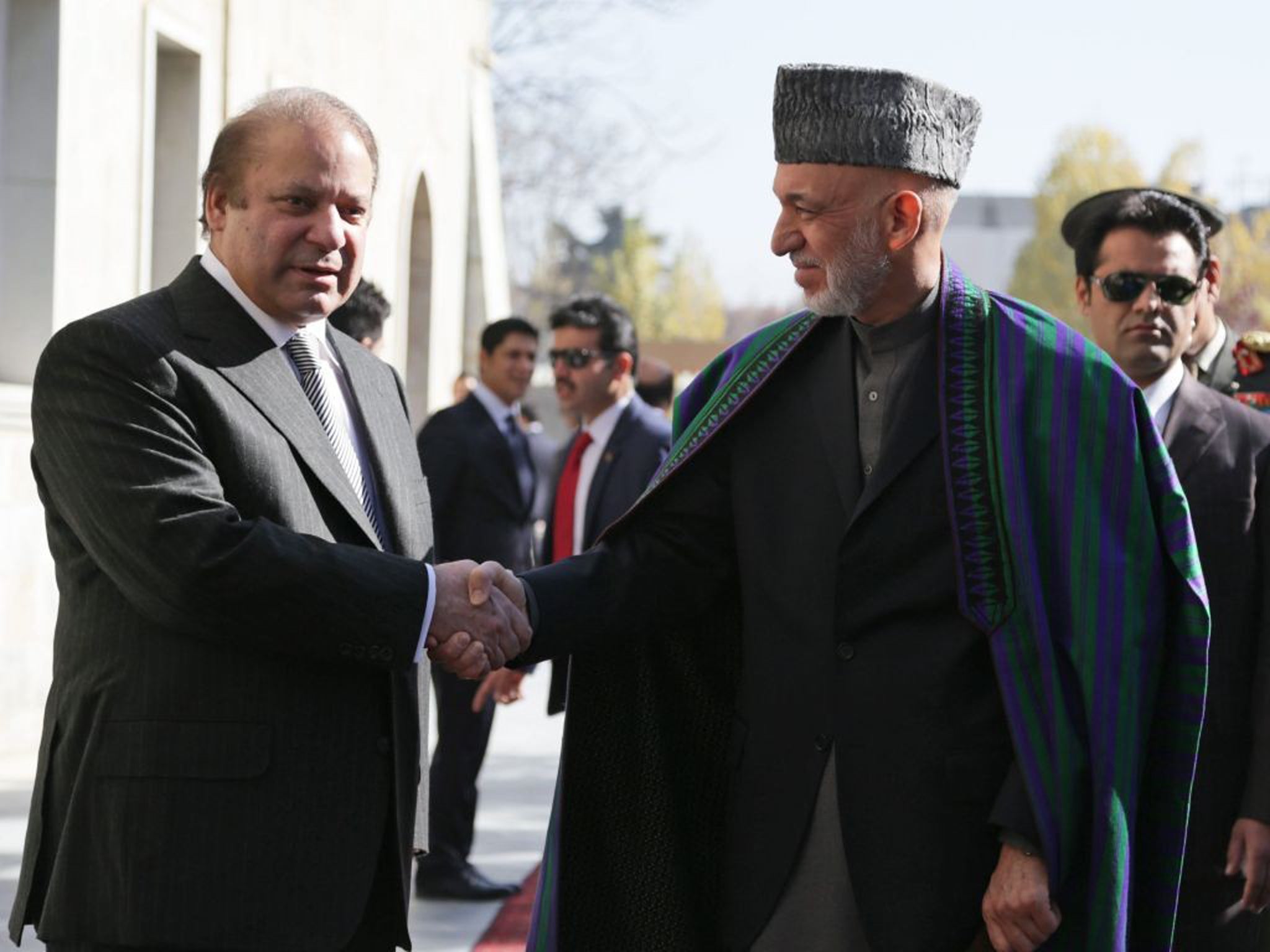Pakistan PM Nawaz Sharif assures Hamid Karzai of peace-talk 'facilitation' after release of senior Taliban leader
Afghanistan considers that Pakistan holds significant influence over Taliban, who are believed to launch attacks from bases in the country

Your support helps us to tell the story
From reproductive rights to climate change to Big Tech, The Independent is on the ground when the story is developing. Whether it's investigating the financials of Elon Musk's pro-Trump PAC or producing our latest documentary, 'The A Word', which shines a light on the American women fighting for reproductive rights, we know how important it is to parse out the facts from the messaging.
At such a critical moment in US history, we need reporters on the ground. Your donation allows us to keep sending journalists to speak to both sides of the story.
The Independent is trusted by Americans across the entire political spectrum. And unlike many other quality news outlets, we choose not to lock Americans out of our reporting and analysis with paywalls. We believe quality journalism should be available to everyone, paid for by those who can afford it.
Your support makes all the difference.Pakistan’s Prime Minister Nawaz Sharif has said that the release of a senior Taliban leader proves his country is committed to fostering peace in Afghanistan despite rising tensions in the region.
During his first visit to Kabul since his election for a third term in May this year, Mr Sharif on Saturday met with Afghanistan’s President Karzai, and assured the leader that “Pakistan would continue to extend all possible facilitation for the Afghan peace process”.
He said the release of Mullah Abdul Ghani Baradar, the former Taliban number two, freed from years of detention last September, would help to jumpstart peace negotiations with the Taliban.
Afghanistan considers that Pakistan holds significant influence over the Taliban, who are believed to launch attacks from bases in the country. But there are concerns over whether the Taliban would listen to their former commander. A delegation from Afghanistan met with Baradar in recent days, the first such meeting since his release.
With US and Nato troops set to leave Afghanistan to stand on its own next year, having been stationed in the country since 2001, Mr Sharif called 2014 a “milestone”. The withdrawal has been a source of tension between the US and Afghanistan with America pushing for a bilateral deal, which has taken a year of pain-staking negotiation, to be signed by the end of the year – allowing thousands of troops to remain stationed in the country.
Mr Kazai has tried to delay the deal until after Afghan presidential elections in the spring, claiming that the US must do more to help the peace talks.
US-backed peace talks between Afghanistan and the Taliban collapsed in June after a office opened by the Taliban in Qatar, which was supposed to herald the best chance at peace, was closed after President Karzai was angered by the fact he believed the Taliban was using the occasion to set up a government-in-exile.
On Friday Mr Sharif called on all parties, including the US to push forward with negotiations
“In our view, the key to sustainable peace in Afghanistan in 2014 and beyond is an inclusive political settlement. That is why Pakistan has steadfastly supported an Afghan-led and Afghan-owned peace and reconciliation process,” he said. “I take this opportunity to once again urge all the stakeholders to seize this moment and join hands to support the peace efforts. It is imperative to reverse the destructive cycle of conflict.”
Following the talks, which also included discussion on trade and energy policy between the two countries, President Karzai said: “Afghanistan and Pakistan will be rescued from terrorism and extremism.”
Despite the platitudes, the meeting between the pair comes at a time of strained relations between both nations and the US, not just over the bilateral deal but predominantly over the use of airstrikes to kill militant targets.
Late last month, Mr Sharif indicated that a dialogue had “started” between Pakistan and the Taliban having promised to open unconditional talks when he was installed.
However, Hakimullah Mehsud, the leader of the Taliban in Pakistan was killed by a drone strike at the beginning of November – which dented plans for talks. Pakistan had said it had planned to send a delegation to the tribal North Waziristan region, where Mehsud was killed. It was reported on Friday that another drone strike in North Waziristan, which borders Afghanistan, had killed at least one alleged member of the Pakistani Taliban was killed.
Mr Sharif and the Pakistani Government have signalled their opposition to the strikes claiming that it violates their sovereignty, in addition to causing civilian casualties.
But Mr Sharif appears reluctant to push America too vigorously over the strikes. His reticence has not affected the Pakistan Tehreek-e-Insaf (PTI) party, led by former cricketer Imran Khan, trying to blockade trucks carrying supplies from Pakistan to Nato troops in Afghanistan in protest over the strikes.
For Afghanistan’s President Karzai, recent American military operations appear to have added to his determination to delay signing of the bilateral agreement between the two nations. In a Presidential statement he condemned a US airstrike in the southern Helmand province on Thursday that killed a small child and injured two other women. Mr Karzai called said the strike ”reveals that American forces have no respect for Afghan lives” and that the pact would not be signed if such “cruelty” continued, demanding that the US stop all airstrikes and raids on Afghan homes.
Perhaps sensing the political damage the incident could cause, the top US commander Afghanistan, Marine Gen. Joseph Dunford, telephoned Mr Karzai late on Thursday night to express “deep regrets for the incident and any civilian casualties”.
Join our commenting forum
Join thought-provoking conversations, follow other Independent readers and see their replies
Comments